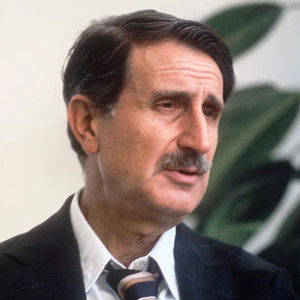Kamal Joumblatt
Birthday: 1917-12-06
Deathday: 1977-03-16
Birthplace: Moukhtara, Lebanon
Gender: Male
Owned By: Unowned
Kamal Jumblatt (كمال جنبلاط), born December 6, 1917 and died March 16, 1977, is a Lebanese politician, founder of the Progressive Socialist Party (PSP), Lebanese Druze leader. He is the father of Walid Jumblatt.
Kamal Jumblatt was born in 1917 in Moukhtara in Lebanon. The Jumblatt family enjoys significant prestige in the Druze community. His father, Fouad Joumblatt, was assassinated on August 6, 1921. After his father's death, his mother, Nazira, took over. She will play an important political role in the country.
In 1926, Kamal Jumblatt entered a Christian school where he completed his elementary studies in 1928. In high school, he studied French, Arabic, science and literature. He graduated from this high school in 1936. He obtained a diploma in philosophy a year later, in 1937. He then left for Paris where he joined the faculty of arts at the Sorbonne. He also studies psychology, civics and sociology.
He returned to Lebanon in 1939, where he continued his studies at Saint-Joseph University in Beirut. He obtained a law degree there in 1945. He married May 1, 1948 with May Arslan (died in 2013), daughter of the Druze emir Chekib Arslan. They will have only one son, Walid Jumblatt.
Kamal Jumblatt, pacifist leader, fighting for democracy, socialism with a human face and a secular Lebanon, still marks memories. Kamal Jumblatt was not destined for politics. The death of his cousin Hikmat naturally designated him as successor, representative of the family. Then, India has always fascinated a young man more inclined to meditate than to govern: he went there at the age of 26: one of the photos shows him plowing. From his time at the Ministry of Agriculture and Social Affairs in 1947 to the violent insurrection of 1958, Kamal Jumblatt asserted his charisma and quickly outlined his ambitions after the creation, in 1949, of the PSP (Progressive Socialist Party): unity of Arab countries, fight against the Lebanese oligarchy to establish real democracy. From 1958, the year of the start of the presidency of Fouad Chéhab, supported by Kamal Jumblatt and his party, to 1969, the date of the first riots with the Palestinians, the Druze politician was Minister of National Education then of the Interior , while tirelessly meeting with various foreign officials in order to initiate a dialogue of peace which he favored above all. He will no longer stop defending the Palestinian cause and admiring the Jordanian position in the conflict which pits the Feyadine against the Israeli army.
From 1970, conflict loomed and peaceful solutions became increasingly bogged down, as Kamal Jumblatt feared and predicted. He became considerably closer to the Soviet Union, which awarded him the Lenin medal in 1970 to honor his work in favor of peace. Indeed, the Druze leader never tires of meeting political and religious leaders from all sides, but cannot escape the war: in 1976, he reviewed part of the People's Liberation Army. A few months later, he was shot dead in his car, along with two of his companions.
Credits
| Year | Title | Character |
|---|
